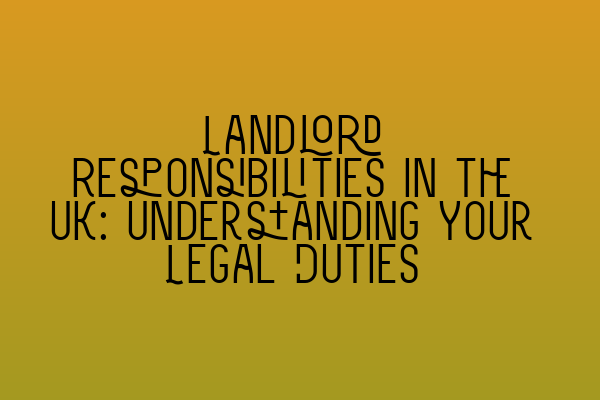Landlord Responsibilities in the UK: Understanding Your Legal Duties
Welcome to SQE Property Law & Land Law, where we provide expert guidance on all matters related to property and land law. Whether you are a seasoned landlord or just starting out in the rental market, understanding your legal responsibilities is crucial. Failure to comply with these obligations can result in legal disputes, financial penalties, and damage to your reputation as a landlord. In this blog post, we will explore the key landlord responsibilities in the UK and help you navigate through the complex landscape of property law with ease.
1. Providing a Safe and Habitable Property
As a landlord in the UK, it is your utmost responsibility to provide a safe and habitable property for your tenants. This means ensuring that the property is free from hazards, including structural defects, electrical problems, and issues with water supply and drainage. Additionally, you must adhere to fire safety regulations and conduct regular inspections to identify and rectify any potential risks.
Related Article: SQE 1 Practice Exam Questions
2. Carrying Out Repairs and Maintenance
Maintaining the property in a good state of repair is a fundamental duty of a landlord. You are responsible for addressing any repairs promptly, which includes fixing faulty appliances, plumbing issues, and structural problems. Regular maintenance tasks, such as garden upkeep and painting, also fall under your jurisdiction. By fulfilling your repair and maintenance obligations, you not only ensure your tenants’ satisfaction but also protect your investment in the property.
Related Article: SQE 1 Practice Mocks FLK1 FLK2
3. Ensuring Adequate Security Measures
Security is a vital aspect of a tenant’s peace of mind and should not be overlooked. Landlords must provide adequate security measures, such as secure locks on windows and doors, functional entry systems, and well-lit common areas. It is advisable to assess the security needs of the property and take appropriate measures to protect your tenant’s safety as well as their possessions.
4. Handling Tenancy Deposits
If you collect a tenancy deposit from your tenants, you are legally obliged to protect it in a government-approved deposit scheme. This ensures that the deposit is held securely and can be returned to the tenant at the end of the tenancy, minus any reasonable deductions for damages or unpaid rent. Failing to comply with deposit protection requirements can lead to severe penalties and potential legal action.
Related Article: SQE 2 Preparation Courses
5. Complying with Health and Safety Regulations
The health and safety of your tenants should be a top priority. As a landlord, you must comply with all relevant health and safety regulations, including gas safety, electrical safety, and fire safety requirements. It is essential to conduct regular checks and obtain the necessary certificates to demonstrate that the property meets these standards. Ensuring your property is compliant not only protects your tenants but also shields you from potential legal liability.
6. Abiding by Anti-Discrimination Laws
Landlords have a legal obligation to abide by anti-discrimination laws when selecting tenants. It is unlawful to discriminate against individuals based on factors such as race, gender, religion, disability, or marital status. Ensure that your tenant selection process is fair, transparent, and based on objective criteria to avoid potential discrimination claims.
7. Understanding Tenancy Agreements
Tenancy agreements play a crucial role in establishing the terms and conditions of the tenancy. As a landlord, you must ensure that the agreement is legally binding, includes all essential terms, and complies with applicable laws and regulations. Seek legal advice to draft or review your tenancy agreement to avoid any loopholes or ambiguities that could lead to disputes down the line.
Related Article: SQE 1 Preparation Courses
8. Handling Tenant Complaints and Disputes
Being responsive to tenant complaints and disputes is essential for maintaining a healthy landlord-tenant relationship. Address any concerns raised by your tenants promptly and strive to find an amicable resolution. In case of unresolved disputes, consider alternative dispute resolution methods, such as mediation or arbitration, before resorting to court proceedings.
9. Staying Updated with Changing Legislation
Property law and landlord responsibilities are subject to change, so it is crucial to stay informed and updated. Regularly review any amendments to legislation that impact your obligations as a landlord. Seek professional advice or attend relevant courses to ensure your compliance and proficiency in managing your rental property effectively.
Related Article: SRA SQE Exam Dates
In conclusion, understanding and fulfilling your landlord responsibilities in the UK is fundamental for a successful and legally compliant tenancy. By providing a safe and habitable property, conducting repairs and maintenance, ensuring security measures, handling tenancy deposits correctly, complying with health and safety regulations, abiding by anti-discrimination laws, understanding tenancy agreements, resolving tenant complaints and disputes, and staying up to date with changing legislation, you can mitigate risks and establish a positive relationship with your tenants.
For further assistance and guidance on property law and landlord responsibilities, contact SQE Property Law & Land Law today!
